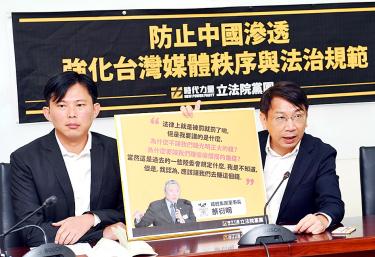The New Power Party (NPP) yesterday proposed amendments that would subject Taiwanese who lobby for Chinese political interests to prison sentences of up to three years and fines of NT$500,000 to NT$5 million (US$15,893 to US$158,932).
Under the drafts to the Act Governing Relations Between the People of the Taiwan Area and the Mainland Area (臺灣地區與大陸地區人民關係條例), Taiwanese individuals and organizations would be banned from lobbying for the political interests of the Chinese government, political parties or organizations that might affect Taiwan’s national security or interests, NPP Legislator Huang Kuo-chang (黃國昌) told a news conference.
While the 2007 Lobbying Act (遊說法) already bans Chinese individuals and organizations from lobbying for their political interests or having others lobby on their behalf, the provision does not entail any punishment and is “almost useless,” Huang said.
While a number of officials have advocated the introduction of a law similar to the US’ Foreign Agents Registration Act, mere transparency would not be sufficient for Taiwan, he said.
The US act, passed in 1938, requires individuals and organizations controlled by foreign governments or organizations to disclose such connections, as well as information about their activities and finances, Huang added.
The drafts are part of a series of amendments proposed by the NPP to enhance protection of the nation’s democracy and security against Chinese infiltration, NPP caucus convener Hsu Yung-ming (徐永明) said.
The party has also proposed amendments to broadcasting laws and the National Security Act (國家安全法) to tighten regulations on media companies controlled by the Chinese government or organizations, and on publishing Chinese Communist Party propaganda, he added.
As many bills are still under review with the legislative session expected to end in a few weeks, Hsu said that he hopes Legislative Speaker Su Jia-chyuan (蘇嘉全) would extend the session to allow more time for discussion.
“In her speech [on Monday] to mark her inauguration anniversary, President Tsai Ing-wen (蔡英文) listed protecting Taiwan’s sovereignty as one of her major achievements,” he said.
Since all three draft amendments are in line with that goal, they should receive support from legislators across party lines and pass soon, Hsu added.
Source: Taipei Times - 2019/05/22





















